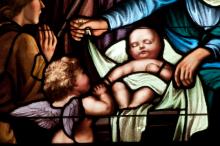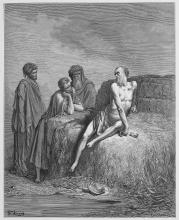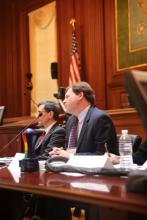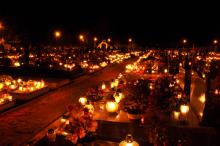Jesus

Last December, I decided to run after dark and entertain myself by running through neighborhoods, looking at lighted Christmas decorations as I passed by. It was a novel twist on my regular exercise, and I enjoyed gazing at the beautiful, the creative, and the tacky alike.
Then, I started noticing the insides of houses, too. The Christmas trees were lit and decorated; the insides of the houses seemed warm and inviting. Suddenly, instead of an independent adult on a crisp winter jog, I felt more like a homeless orphan from a George MacDonald Christmas story looking in at something I did not have and of which I could not be a part. Needless to say, the run lost its sense of adventure.
Recently, it has struck me how strange the situation was, both in what I saw Christmas to be and in my decision that I “didn’t have it.”

I was encouraged by the findings of U.S. District Court Judge Richard Leon on Monday who granted an injunction to plaintiffs Larry Klayman and Charles Strange that will temporarily stop the National Security Agency from continuing their data-gathering program that mines information from our mobile phone calls.
The injunction was issued because the judge believes that Klayman and Strange likely will win their lawsuit against the federal government, claiming that the phone record collection practice is an unconstitutional violation of personal privacy.
The whole storyline is made that much more dramatic since the otherwise secret program was leaked to the public by former NSA contract Edward Snowden, who is now on the run, seeking asylum in exchange for shared intelligence. And while some perceive Snowden as a hero of individual liberty, others vilify him as an enemy of the United States, much like any other terrorist. Interestingly, people’s opinions about the NSA — and, frankly, the Obama administration and the government as a whole — diverge in similar ways.

There is certainly a warm, nostalgic feeling about the Christmas season. Social media fill up with pictures of Starbucks holiday cups and we get the play-by-play of Christmas trees being purchased and filled with homemade ornaments. Holiday parties become about as frequent as breathing and there is a general sense of camaraderie among people who wouldn’t otherwise interact.
As a local practitioner and neighbor, I’d even go as far as saying this season brings about the most opportunity for new relationships and shared life in the realities of everyday.
Last week I was talking to my 3-year-old daughter about Christmas. She knows we are going to see grandparents and cousins and even knows a thing or two about gifts being exchanged.
And then I asked her, "Whose birthday do we celebrate on Christmas?" With a big smile, she said, "Santa!"
Now, I get it. She’s 3 years old, it’s kinda cute and harmless and whatever.
But there is something to this.
Our family never talks about Santa Claus, but we regularly talk about Jesus and even go as far as trying to live like him as best we can. When we do talk about Christmas and presents, we try to talk about how we will be giving them away to friends, family, and people who need them.
But, despite our best efforts, Christmas is associated with Santa Claus. Now, if it were the historical “Santa Claus” who gave away his best to save the lives of some children, that’d be awesome. But, no, this is the Santa Claus of consumption who promotes values of selfish acquisition rather than sacrificial giving.

As we prepare for the coming of Christ, the third Sunday of advent is celebrated in joy. As followers of Christ, it is reasonable to be exuberant about the birth of our Savior. The amount of happiness that can seep from the soul in response to a virgin birth, a perfect baby boy, and an adorable scene of livestock and shepherds befriending God’s family is immeasurable. Christmas music, Christmas decorations, and yes, even Christmas presents add to the joy and never fail to put a smile on my face.
This past weekend, as I tried to reflect on what it means to be joyful in Christ, my heart was temporarily hardened as I attended a Reentry Arts & Information Fair for returning citizens. I helped host a table for Becoming Church and their Why We Can’t Wait initiative.
With just a few days to go before Christmas, many Americans will be rushing around completing their Christmas preparations: doing their last minute shopping, finalizing travel plans, figuring out how to deal with awkward family dynamics. In many cases, they will be faced with what is popularly known as #firstworldproblems — problems of inconvenience of a privileged and affluent people: delayed flights, out-of-stock gift items, spotty cell phone coverage.
At the same time, many people, hidden amidst the consumer celebration that Christmas has become, will be struggling just to find their next meal, shelter, community, and hope.
Striking census bureau statistics released earlier this year paint a picture of an expanding American underclass, with 15% of Americans living at or below the poverty-line, 23% of children (the highest percentage of poor by age) living in poverty, and the evaporation of the American middle class.
On the one hand, at this time of year, our society is more aware of the poor. Holiday food collections, toy and clothing drives abound, as does the ubiquitous ringing of Salvation Army bells. And yet, in many ways the plight of the poor is more hidden by the bright lights and rush of the season.

One of the downsides of a theological education (and/or an overactive theological imagination) is an inability to sing some favorite old hymns with naive gusto. During this Christmas season in particular, we simply know too much about the biblical story (and the reality of childbirth and babies in general) to fully believe all of the touching words in some of the most popular Christmas carols.
So as a public service, I have written historically accurate versions of three of the most beloved holiday hymns. Without personally endorsing any of the theology below, I also offer some alternatives to those who don't theologically jive with the current version of "Joy to the World."

This past Sunday, I had the opportunity to watch our children’s ministry present through play, song, and dance the story of the birth of Jesus Christ.
No matter how many times I have seen this story, it’s always amazing that this miracle that happened in a manger could have such a huge impact on the lives of so many. Jesus was not born with a silver spoon in his mouth, his parents did not have the best reputation, and he definitely wasn’t birthed in a fancy hospital. Instead, he was born where animals were kept — not the best conditions environmentally at all! Further, Jesus Christ became an advocate for the poor, for those that do not always have a voice, and for those that were suffering from terrible mistreatment, disease, and sickness.
I truly believe that Jesus’s focus on the “least of these” is a model for advocacy, especially for the environmental justice movement.

Editor's Note: New Vision Renewable Energy connects Christians with opportunities to provide renewable solar lights to people in the developing world. Their Christmas Lights Advent Devotional features daily readings and questions from prominent Christian thinkers, including Sojourners president Jim Wallis. This Day 10 of Advent devotional from Jim Wallis is reprinted and adapted with permission of New Vision Renewable Energy. You can find the full Christmas Lights Advent Devotional guide and solar light kits here: http://nvre.org/devotional-order.html
Proclaiming Jesus as light of the world is an audacious statement. It directly challenges all those idols that persistently attempt to replace God as the center of our lives and our world. In our culture, a selfishness that denies any obligation to anyone or anything beyond our own self-interest may be the greatest idol of all. It denies that demanding more and more energy at great cost to our environment and the people who live close to the land has problematic consequences. We have lost sight of the common good and the consequences have been devastating.
In many places, hope has turned into despair. Darkness seems to be crowding out light. From where will our help come from?

I’d say the moment is ripe for “Christ in Christmas” — the real Christ, of course, who shunned the privileged and aligned himself with sinners and outcasts, whose heart went out to sufferers like the homeless of Rome whom a new pope risks serving.
I’d say the moment is ripe for new life being born in stables and forced to flee the powerful and greedy. We have seen Mammon’s insatiable maw, power’s absolute corruption of the human soul, and thugs murdering the many in order to protect the few — and we know our need of something better.
So, yes, it’s time for Christ in Christmas. Time for new life, time for hope, time for the faithful to say yes to God. Time for peace, not war. Time for repentance, not comfort at any cost. Time for justice and mercy and the even-handed goodness that God promised.
This, of course, isn’t what zealots mean when they vow to “defend” the faith from a culture’s “war on Christmas.” They want a free-fire zone where moralizers can denounce all but the like-minded, and churches with huge budgets can frighten or seduce worshippers into donor mode. They mean using Jesus’ name to impose the very cultural and political oppression that Jesus escaped once as a child but couldn’t escape as an adult.

Way back in the day (circa 2004), Switchfoot's lead singer, Jon Foreman, was asked if the band is a “Christian” band. Even though it's been a while, his response is worth looking at again.

Brace yourselves. The calendar has turned over to December, which means that the inevitable discussion on the “War on Christmas” will soon see it’s opening salvo for 2013.
It is inevitable. There will be an outrage by a prominent figure about how we have lost our moral fabric because as someone was buying gifts with money they don’t have to impress people that they don’t always like, the cashier will commit the unthinkable sin of wishing us a “Happy Holidays” instead of “Merry Christmas.”
There will be gnashing of teeth as a town or city somewhere will have a “Holiday Parade” rather than a “Christmas Parade,” as Tulsa had done several years ago. (The parade was subsequently boycotted by one of it’s senators.)
The chorus of those who would profess to be Christians will shout that the “Political Correctness Police” have overstepped yet another boundary and that we should not take the “Christ out of Christmas” as the batch of perceived slights against Christendom freshly reveal themselves for this holiday season.
As a person who would say that Jesus is the most important thing in my life, who has devoted my life to the service of God’s Kingdom, and spends all of my waking moments trying be faithful to that devotion, I have to ask: “What exactly do we mean by putting the ‘Christ back in Christmas'?”

The world of Christian theology has seen its fair share of writings that address horrible suffering and the confusion about God’s character that it causes. The question has been on my mind in light of the Philippines’ calamity. Although satisfying answers are difficult to come by with a topic like this, I offer a few insights that have helped me to continue to trust God’s love. The biblical character of Job shows us how, as believers in a loving God, we should regard and respond to suffering around us.
It no longer surprises me when I hear people express cynicism and doubt about a caring God — I sometimes wonder why more Christians have not done so. Whose faith can remain undisturbed when Typhoon Haiyan kills 5,000 Filipinos and inflicts misery on thousands more? I recall a photo of a woman weeping by her child’s body inside a damaged church. Who can imagine her despair? Can we conceive of the hell endured in the same region by enslaved women and girls who are raped and degraded every day, every hour?

The religion section of The Huffington Post published an article on Tuesday about how some Christians are responding to Costco. Unfortunately, it wasn’t about how Christians are celebrating the fact that this big-box store not only makes a profit and actually pays its employees a living wage.
That, after all, would be Good News.
No. These Christians have their panties in a bunch because Costco had Bibles labeled as fiction.
*Gasp*

I think what turned me off the most was the hair. It was just so ... big. And the scrappy “don’t mess with Texas” vibe. And the fact that evangelical moms all over the country were fans. As a third generation New Yorker, cynicism and snark have been bred into me, along with an affinity for black clothing and pretentious coffee. So it has surprised everyone — including me — that I have spent the past year going through (and recommending) Beth Moore studies.
How did it happen? Well, I moved from my hometown of New York City to Washington, D.C., and while I was exploring various employment opportunities, I had a lot of free time. The wife of the former associate pastor at the church I’d started attending invited me to join a “women’s Bible study” that met on Friday mornings. They were doing a Beth Moore study called Breaking Free. It seemed fishy to me — who are the only women who have free time on Friday mornings? Moms. And Beth Moore? I had spent six years attending and four years on staff at a church in New York that got super famous because of its own rockstar, hyper-intellectual, and somewhat post-modern teaching. We prided ourselves on not being ... well, like Beth Moore.
Still, I was trying to be open to life in my new city so ...
I walked into the group a couple of minutes late wearing gold sequin pumps, skinny jeans, and a red leather jacket — what I would normally wear to bum around town in my old life. I could not have been more out of place amidst the yoga pants and baby blankets. But I met some of the most awesome women I’ve known in D.C. and more importantly — I met Beth.

Macy's decided to open its doors to shoppers on Thanksgiving Day at 8:00 p.m. Time magazine reports that people are denouncing the move as “greedy, misguided, and unfair to the employees being forced to work on a day traditionally reserved for family.”So how is Thanksgiving doing? Is it deceased, or has its death been greatly exaggerated?
The apostle Paul must have wondered about this when he wrote his letter to the Colossians, a group of Christians living along a main roadway in Asia Minor — what is now modern Turkey. They were pulled between the values of their faith and the values of their culture, much as we are today. Paul warned them, “See to it that no one takes you captive through philosophy and empty deceit, according to human tradition, according to the elemental spirits of the universe, and not according to Christ” (Colossians 2:8).
These words ring true today, don’t they? We know the philosophy of trying to spend ourselves out of economic troubles. The empty deceit of a sales pitch. The human tradition of making the holidays an orgy of consumption. The elemental spirits of the universe that lure us away from Jesus Christ.
Paul asked the Colossians, and he asks us, “Why do you live as if you still belonged to the world?” (2:20). It’s a good question, one that we should ask ourselves on Thanksgiving Day, and every day.

“Lord, when were you in prison?” we’ll ask of you one day;
And when did we go visit you, and listen well, and pray?
And when did we show mercy there (as we need mercy, too)?
As we love those in prison, Lord, we show our love to you!
When you taught love of neighbor, had you heard in your time
Of one who lay beside the road, a victim of a crime?
The neighbor that you said was good brought help and wholeness, too;
May we help those who hurt so much from crimes that others do.

There is an awesome moment in the opening chapter of the book of Luke where the writer frames his gospel as an epic celestial battle taking place in the heavenly realm: This is the story of the reign of men vs. the reign of God.
Luke makes it clear. What happened in these pages began in the days of King Herod of Judea (Luke 1:5). King Herod was a product and protector of empire. His father was appointed procurator of Judea by Julius Caesar. He subsequently appointed Herod military prefect of Galilee. After the death of Julius, Antony, and Octavian, Augustus Caesar favored Herod and gave him the name "king of the Jews," eventually becoming governor of Judea.
Herod was most concerned with maintaining his power — at all costs. He built the Roman Empire at his own people's expense. He built great monuments and structures, including the reconstruction of the Jerusalem Temple, enslaving his own people to do it. He used the Jews' labor to erect temples to pagan deities, and, paranoid of anyone who might usurp his power, Herod schemed against his own family, executing three of his own sons for insurrection — one only a few days before his death.
Enter a priest named Zechariah and his wife, Elizabeth.

The Environmental Protection Agency held listening sessions Thursday to hear from the public about a forthcoming rule about carbon emissions from existing power plants. More than 20 faith leaders spoke on behalf of those Jesus called “the least of these.” In addition to such faith leaders as Rev. Dottie Yunger and Interfaith Power & Light’s Joelle Novey, other parties, from pro-coal Sen. Mitch McConnell, R-Ky., and coal lobbyist Mike Carey to the Sierra Club’s Leslie Fields and League of Conservation Voters’ Gene Karpinski, were on hand to testify. Those testifying had three minutes apiece to voice their views on what the new rule on emissions should look like.
Prior to the testimonies, more than 20 faith leaders assembled outside of the EPA to pray that God’s creation would be restored. Organized by Creation Justice Ministries and Greater Washington Interfaith Power and Light, the vigil featured songs of hallelujah and peace. Novey read a Jewish prayer for travelers, asking God to lead us into safety.
After the worship service, the faith leaders joined a diverse audience to testify to the EPA about the importance of battling climate change. I saw five faith leaders speak, reminding the agency that they not only have a technocratic responsibility to create a stringent rule limiting carbon emissions, but also a moral responsibility to do so.

For centuries, followers of Jesus have wondered how they should relate to states and governments. Recent documents from Amnesty International, Human Rights Watch, and the United Nations bring such concerns to the fore, highlighting the cruel collateral damage of many of President Barack Obama’s personally ordered drone strikes — strikes that according to the president, are legal and in accord with international law, use technology that is precise and limit unnecessary casualties, eliminate people that are real threats, and prevent greater violence.
Rather than considering the humanity of our (perceived) enemies and seeking reconciliation and restorative justice, we default to catching and killing. In doing so, we give the widest berth possible to Jesus's teachings and examples of self-sacrificial enemy love. In both Matthew 5 and Luke 6, Jesus tells us that to love our enemies is to be children of God, for radical love and kindness are his nature and his perfection. Loving enemies is essential to anyone who would claim God as his or her Father. Jesus said, "Love." Not, "Love unless you happen to be the ones in charge and in possession of firepower. In that case, kill the bastards."
We are charged with loving our world indiscriminately, self-sacrificially, and with great humility, and that should always inform our relationship with the state and government.

I probably shouldn’t admit how much I like Halloween. I’m too much of a slug to deck out my house, I rarely wear a costume, and I haven’t been to a wild party in years, but I love the excitement children bring to the whole process. Then again, there’s the classic It’s the Great Pumpkin, Charlie Brown – what’s better than that? I’m pretty much a sucker for Halloween.
I was already an adult when I learned how we came upon Halloween. All Hallows’ Eve marks the night before All Hallows’ Day, or All Saints’ Day, when Christians celebrate those who have preceded us in the faith. Some churches honor great heroes of the faith, the “saints” of our past. Other churches emphasize that all believers are “saints,” not because we are especially virtuous but because we are made holy simply by God’s will. In some churches, the label “saints” joins us not only to our deceased forebears but also to our living sisters and brothers scattered around the world. (Still other churches simply don’t observe the day at all.)